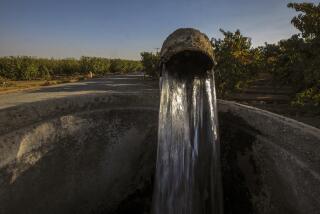Wilson--and Others--Must Zero In on the 80% Solution : Keys to surviving water crisis: luck, outside help and stubbornness
- Share via
Because California’s drought has achieved historic scale, it is now clear that no governor has ever had to learn more about water in less time than Gov. Pete Wilson. His reward is not a diploma but an obligation to start the messy task of reshaping state policy to make California, if not drought-proof, at least more drought-resistant than it is.
It will take luck, outside help and stubborn determination to free huge amounts of water now trapped in the San Joaquin Valley to get California farmers in the habit of selling surplus water, manage supplies better and at the same time protect the environment. But the stakes are so high that Wilson has no choice.
As author Marc Reisner described the challenge on these pages recently, Wilson must chart better ways of dividing California water supplies among farms, cities and nature itself, “or else much of what we cherish about California is doomed to disappear.”
The mechanics of change are relatively simple; only the politics is complex. Agriculture, which produced $18 billion of the state’s $764 billion gross product last year, used more than 80% of its water. Cities and industries, which will generate the rest of the billions, get the 20% that is left over. The politics is difficult because agriculture was once the state’s biggest single enterprise, has a century of law and custom on its side and is better organized to lobby for water than city residents.
Wilson’s first bit of luck came with recent storms that in a matter of days doused the state with 25% of a full year’s rainfall. It did not break the drought, but it is a tremendous break, particularly if the dry spell were to stretch into 1992. Some outside help also turned up.
CENTRAL VALLEY: It came from U.S. Sen. Bill Bradley (D-N.J.), chairman of the water and power subcommittee of the Senate Committee on Energy and Natural Resources.
Bradley wants to rewrite the rules that govern operations of the Central Valley Project that distribute more than 7 million gallons of water, mostly to farms, in the San Joaquin Valley. That is more water than all of the people in all of the cities of California now use, but none of it can be sold for use in cities south of the valley. Bradley’s bill, co-sponsored by Sen. Alan Cranston (D-Calif.) would allow some sales to cities, particularly in drought years.
MARKETING: Wilson has already approved the state’s buying water from farmers at prices high enough to make it worth their while to leave some of their land fallow for a year or for as long as the drought persists. But it’s also useful to recall that Sacramento ignored the efforts of the Environmental Defense Fund to experiment with such water sales for a decade.
Too many farmers were caught by surprise when the state Department of Water Resources began trying to buy agriculture’s water for resale to cities or other farmers. Because farmers were not familiar with the process, it is taking longer than it should to acquire rights to the 500,000 or so acre-feet that the state thinks it needs. Wilson must make certain --perhaps with a law--that the state Water Bank stays in business permanently.
MANAGEMENT: The Environmental Defense Fund also insists that the state must do a better job of managing water supplies in dry years. A plan for holding back water as droughts drag on to avoid the sort of sudden cutbacks by rationing that have hit California recently is inadequate, the organization says, but even that was ignored in the first years of the drought.
Reserves are so low now that the State Water Resources Control Board will meet Wednesday to consider curtailing the flow of water from the Sacramento River Delta into San Francisco Bay, a flow that keeps brackish bay water out of the delta water that is shipped south by the State Water Project. It should be done only as a last resort.
Such changes are tall orders, all requiring resolute action. But Reisner is right. The very nature of California and a way of life that people cherish are at stake.
More to Read
Sign up for Essential California
The most important California stories and recommendations in your inbox every morning.
You may occasionally receive promotional content from the Los Angeles Times.













